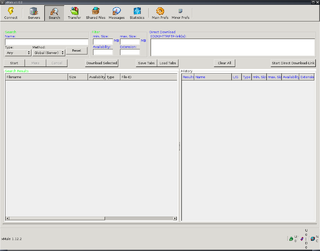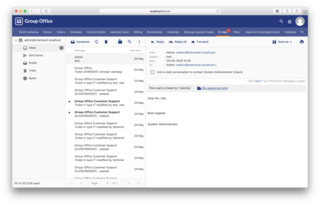Slashdot is a social news website that originally billed itself as "News for Nerds. Stuff that Matters". It features news stories on science, technology, and politics that are submitted and evaluated by site users and editors. Each story has a comments section where users can add online comments.
SourceForge is a web service that offers software consumers a centralized online location to control and manage open-source software projects and research business software. It provides source code repository hosting, bug tracking, mirroring of downloads for load balancing, a wiki for documentation, developer and user mailing lists, user-support forums, user-written reviews and ratings, a news bulletin, micro-blog for publishing project updates, and other features.

GNU Savannah is a project of the Free Software Foundation initiated by Loïc Dachary, which serves as a collaborative software development management system for free software projects. Savannah currently offers CVS, GNU arch, Subversion, Git, Mercurial, Bazaar, mailing list, web hosting, file hosting, and bug tracking services. Savannah initially ran on the same SourceForge software that at the time was used to run the SourceForge portal.

Gambas is the name of an object-oriented dialect of the BASIC programming language, as well as the integrated development environment that accompanies it. Designed to run on Linux and other Unix-like computer operating systems, its name is a recursive acronym for Gambas Almost Means Basic. Gambas is also the word for prawns in the Spanish, French, and Portuguese languages, from which the project's logos are derived.

GNU Mailman is a computer software application from the GNU Project for managing electronic mailing lists. Mailman is coded primarily in Python and currently maintained by Abhilash Raj. Mailman is free software, licensed under the GNU General Public License.

xMule is a discontinued free client for the eDonkey peer-to-peer file sharing network intended to bring it to virtually all the major Unix platforms, with a particular emphasis on Linux.

Horde is a free web-based groupware. The components of this groupware rest on the Horde framework, a PHP-based framework provides all the elements required for rapid web application development. Horde offers applications such as the Horde IMP email client, a groupware package, a wiki and a time and task tracking software.
Browser hijacking is a form of unwanted software that modifies a web browser's settings without a user's permission, to inject unwanted advertising into the user's browser. A browser hijacker may replace the existing home page, error page, or search engine with its own. These are generally used to force hits to a particular website, increasing its advertising revenue.
Lemon is a parser generator, maintained as part of the SQLite project, that generates a look-ahead LR parser in the programming language C from an input context-free grammar. The generator is quite simple, implemented in one C source file with another file used as a template for output. Lexical analysis is performed externally.

cmus is a console audio player for Unix-like operating systems. cmus is distributed under the terms of the GPL-2.0-or-later and is operated exclusively through a text-based user interface, built with ncurses.

Black Duck Open Hub, formerly Ohloh, is a website which provides a web services suite and online community platform that aims to index the open-source software development community. It was founded by former Microsoft managers Jason Allen and Scott Collison in 2004 and joined by the developer Robin Luckey. As of 15 January 2016, the site lists 669,601 open-source projects, 681,345 source control repositories, 3,848,524 contributors and 31,688,426,179 lines of code.

Group-Office is a PHP based dual license commercial/open source groupware and CRM and DMS product developed by the Dutch company Intermesh. The open source version, Group-Office Community, is licensed under the AGPL, and is available via GitHub. GroupOffice Professional is a commercial product and offers additional business modules like project management, finance, HR and time tracking.
Linux.com is a website that is owned by the Linux Foundation, where the goal of the site is to provide information about open source technology, careers, best practices, and industry trends. It also acts as a hub for the Linux community. Linux.com offers free Linux tutorials, certifications, news and blogs, discussion forums and groups, a Linux software and hardware directory, and a job board.
Geeknet, Inc. is an American company that is a subsidiary of GameStop based in Fairfax County, Virginia. The company was formerly known as VA Research, VA Linux Systems, VA Software, and SourceForge, Inc.

Jeff Bates, also known as hemos, is the co-founder of Slashdot along with Rob Malda ("CmdrTaco").

OSDN is a web-based collaborative development environment for open-source software projects. It provides source code repositories and web hosting services. With features similar to SourceForge, it acts as a centralized location for open-source software developers.

Dice.com is a career website based in New York City with primary sales and development operations in Urbandale, Iowa and Denver. It serves information technology and engineering professionals, as well as contract and permanent engineering staffing firms. Dice.com is owned by DHI Group, Inc. . Dice.com typically has approximately 80,000 tech job listings. The website claims to have 3 million registered technology professionals and approximately 2.4 million unique visitors each month. Of those registered users, 75% have a bachelor's degree or higher and 65% have 10 or more years of experience in their field.

Nathan Oostendorp is an American technologist, author, and entrepreneur. He is from Holland, Michigan and is a co-founder of the technology news website and community Slashdot and founder of the online community Everything2.
A potentially unwanted program (PUP) or potentially unwanted application (PUA) is software that a user may perceive as unwanted or unnecessary. It is used as a subjective tagging criterion by security and parental control products. Such software may use an implementation that can compromise privacy or weaken the computer's security. Companies often bundle a wanted program download with a wrapper application and may offer to install an unwanted application, and in some cases without providing a clear opt-out method. Antivirus companies define the software bundled as potentially unwanted programs which can include software that displays intrusive advertising (adware), or tracks the user's Internet usage to sell information to advertisers (spyware), injects its own advertising into web pages that a user looks at, or uses premium SMS services to rack up charges for the user. A growing number of open-source software projects have expressed dismay at third-party websites wrapping their downloads with unwanted bundles, without the project's knowledge or consent. Nearly every third-party free download site bundles their downloads with potentially unwanted software. The practice is widely considered unethical because it violates the security interests of users without their informed consent. Some unwanted software bundles install a root certificate on a user's device, which allows hackers to intercept private data such as banking details, without a browser giving security warnings. The United States Department of Homeland Security has advised removing an insecure root certificate, because they make computers vulnerable to serious cyberattacks. Software developers and security experts recommend that people always download the latest version from the official project website, or a trusted package manager or app store.












